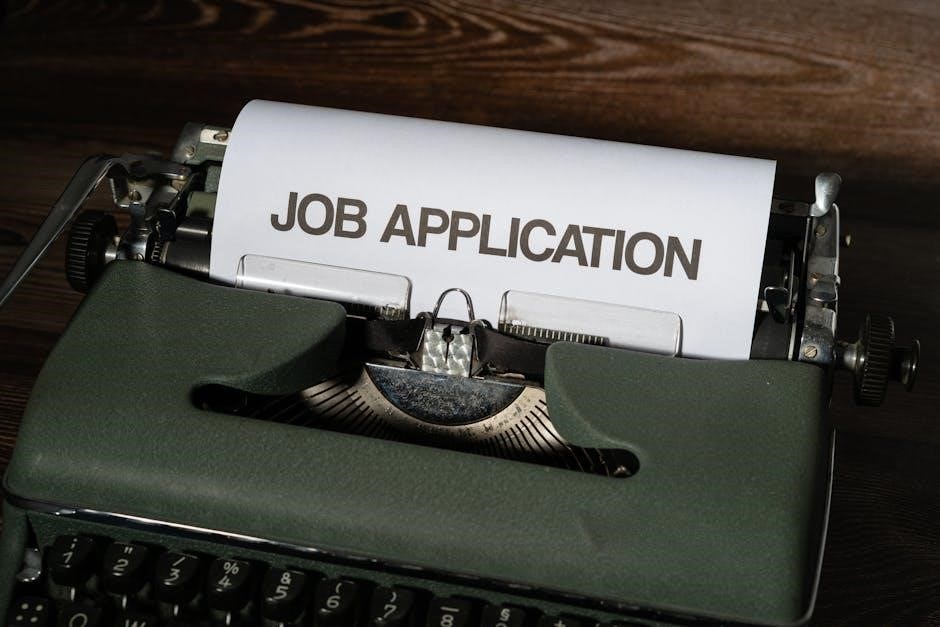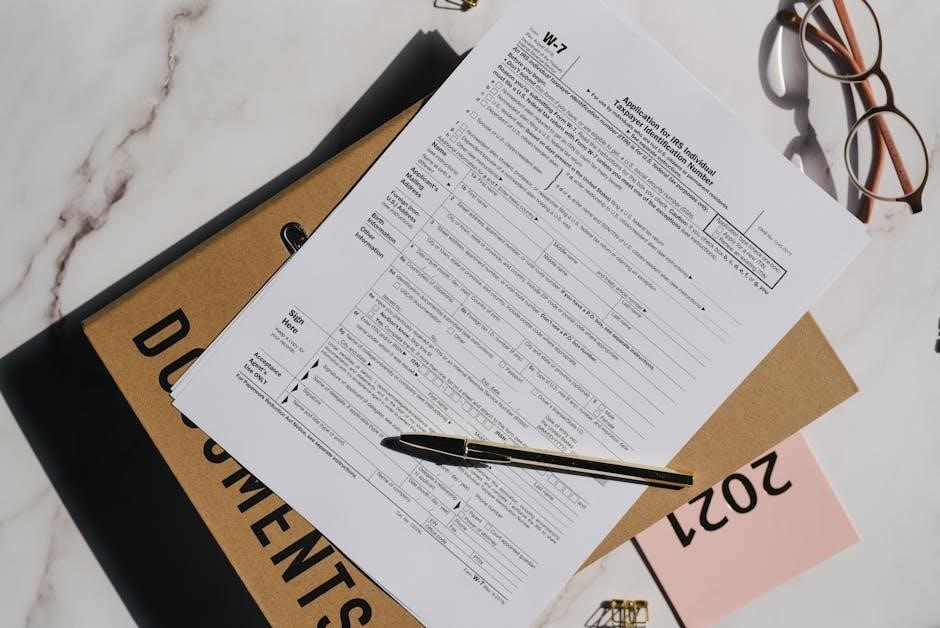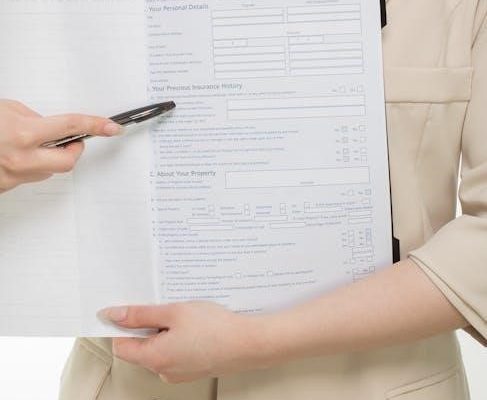A hardship license in Illinois‚ known as a Restricted Driving Permit (RDP)‚ allows individuals to drive for essential purposes like work‚ medical appointments‚ or school during a license suspension. It is designed to alleviate severe inconveniences caused by the loss of driving privileges‚ ensuring individuals can maintain employment‚ education‚ or healthcare access while adhering to specific restrictions. Understanding the legal process and requirements is crucial for a successful application.
1.1 Definition and Purpose of a Hardship License
A hardship license‚ formally known as a Restricted Driving Permit (RDP)‚ is a limited driving privilege granted to individuals whose licenses are suspended or revoked. Its purpose is to enable essential driving for work‚ education‚ medical appointments‚ or other critical needs. This permit ensures individuals can maintain daily responsibilities while adhering to specific restrictions‚ providing a temporary solution to alleviate severe inconveniences caused by license loss.
1.2 Importance of Understanding the Application Process
Understanding the application process for a hardship license is crucial for a successful outcome. Navigating the complex requirements‚ including necessary documents and evaluations‚ ensures compliance with state regulations. Missing deadlines or providing incomplete information can lead to denial‚ delaying the restoration of driving privileges. Proper preparation and adherence to the process help individuals regain limited driving rights efficiently‚ minimizing disruptions to their daily lives.
Eligibility Criteria for a Hardship License
Eligibility for a hardship license in Illinois requires proof of significant hardship‚ such as the need for employment‚ education‚ or medical care. Applicants must provide necessary documents‚ including professional evaluations and court records‚ and meet specific legal standards to demonstrate eligibility for restricted driving privileges.
2.1 General Requirements for Applicants
To qualify for a hardship license‚ applicants must meet specific criteria‚ including providing a valid ID‚ proof of current car insurance‚ and court documents related to the conviction. A professional alcohol/drug evaluation and completion of any mandated remedial education or treatment are also required. Applicants must demonstrate a genuine need for driving privileges and submit all necessary forms to the Secretary of State.
2.2 Specific Circumstances That Qualify for a Hardship License
Applicants must prove a hardship exists‚ such as the inability to maintain employment‚ attend school‚ or access medical care without driving. The need for transportation must be critical and unmanageable by alternative means. Additionally‚ individuals must demonstrate compliance with court-ordered requirements‚ including completion of alcohol/drug evaluations and remedial programs‚ to qualify for a hardship license in Illinois.
The Application Process for a Hardship License
The process involves obtaining and completing the application form from the Secretary of State or their website‚ gathering necessary documents‚ and submitting the application in person or by mail with required fees.
3.1 Obtaining and Completing the Application Forms
Obtain the hardship license application form from the Illinois Secretary of State’s office or their official website. Ensure all fields are filled out legibly and accurately‚ providing detailed information about your circumstances. The form must be completed in full‚ with no sections left blank‚ to avoid delays or rejection. Additionally‚ form DAH H 12 is required for formal hearings. Once completed‚ ensure all information is correct before submission.
3.2 Required Documents and Evidence
To support your hardship license application‚ you must submit specific documents. These include a formal hearing request (form DAH H 12)‚ proof of hardship‚ a professional alcohol/drug evaluation‚ and court documents related to the conviction. Additionally‚ you must provide proof of current car insurance and a valid ID. Ensure all documents are complete and accurate to avoid delays in processing your application.
3.3 Submitting the Application and Fees
After completing the hardship license application‚ submit it along with the required fees to the Illinois Secretary of State. Ensure all documents are enclosed and forms are filled accurately. The application must be mailed‚ and processing fees apply. Note that the hardship license does not replace your full driver’s license‚ so follow submission guidelines carefully to avoid delays.

Required Documents and Evidence
Applicants must provide proof of hardship‚ a professional alcohol/drug evaluation‚ and court documents. These documents demonstrate the necessity for limited driving privileges and compliance with legal requirements.
4.1 Proof of Hardship and Necessity
Applicants must demonstrate how the inability to drive causes significant life challenges. Evidence may include documentation of employment requirements‚ educational needs‚ or medical necessities. A formal hearing may be required to validate the severity of the hardship. This proof ensures the hardship license is granted only when driving is essential for maintaining daily life responsibilities and obligations. Specific evidence must clearly illustrate the necessity of limited driving privileges.
4.2 Professional Alcohol/Drug Evaluation
A professional alcohol/drug evaluation is required for applicants‚ especially those with DUI-related offenses. Conducted by a licensed professional‚ it assesses dependency issues and fitness to drive. The evaluation must be submitted with the application and may require proof of treatment or rehabilitation. This step ensures safety and accountability‚ particularly for cases involving substance abuse.
4.3 Court Documents and Proof of Remedial Education
Court documents related to the conviction‚ such as DUI records‚ must be submitted with the application. Additionally‚ proof of completion of remedial education or treatment programs is required. These documents demonstrate accountability and compliance with legal and rehabilitative requirements‚ ensuring the applicant has addressed underlying issues before regaining driving privileges. This step is critical for a successful hardship license application.

The Hearing Process
The administrative hearing evaluates eligibility for a hardship license‚ requiring applicants to present evidence and justify their need for restricted driving privileges. Proper preparation is essential.
5.1 Purpose of the Administrative Hearing
The administrative hearing determines if granting a hardship license is justified. It assesses the applicant’s circumstances‚ ensures compliance with legal requirements‚ and evaluates the necessity of restricted driving privileges for essential activities‚ balancing public safety with individual hardship.
5.2 Preparing for the Hearing
Preparation for the administrative hearing involves gathering all required documents‚ such as proof of hardship‚ professional evaluations‚ and court records. Reviewing your driving history and understanding the restrictions of a hardship license is essential. Practicing your testimony and consulting with an attorney can help ensure a strong presentation of your case‚ improving the likelihood of approval.
Restrictions and Limitations of a Hardship License
A hardship license restricts driving to specific destinations‚ such as work‚ school‚ or medical appointments. It may also impose time and geographic constraints‚ ensuring compliance with the permit’s terms.
6.1 Permissible Driving Activities
A hardship license allows driving to specific destinations‚ such as commuting to work‚ school‚ or medical appointments. It may also cover essential family responsibilities or grocery shopping. The permit requires pre-approved destinations and times‚ ensuring compliance with the restrictions imposed by the Illinois Secretary of State. Any deviation from these approved activities can result in penalties or loss of the permit.
6.2 Time and Geographic Restrictions
A hardship license includes specific time and geographic limits. Driving is restricted to essential activities during approved hours and within designated areas. The permit may limit travel to routes between home‚ work‚ and school or medical appointments. Mileage restrictions may apply‚ and any violations can result in permit revocation or extended suspension‚ emphasizing the need for strict adherence to the terms set by the Illinois Secretary of State.

Fees and Costs Associated with the Hardship License
Applicants must pay application and processing fees for a hardship license. Additional costs may include professional evaluations‚ court documents‚ and other required paperwork‚ supporting the administrative review process.
7.1 Application and Processing Fees
Applicants for a hardship license in Illinois must pay a non-refundable application fee and processing fee. The exact amount varies‚ but it typically includes a base fee for the Restricted Driving Permit (RDP) application. Additional costs may apply for professional evaluations or required documents. The Illinois Secretary of State’s office provides the application form and details on all associated fees. Failure to pay may delay processing.
7.2 Additional Costs for Required Evaluations and Documents
Beyond the application fee‚ applicants may incur costs for professional alcohol/drug evaluations‚ court documents‚ and remedial education. These are mandatory for certain cases and vary in cost depending on the provider. Ensure all required documents are submitted to avoid delays‚ as these additional expenses are necessary to support your hardship license application in Illinois.
Duration and Reinstatement of Full Driving Privileges
A hardship license is temporary‚ typically lasting until your suspension or revocation period ends. Full privileges are reinstated after completing the required period or meeting specific conditions.
8.1 Temporary Nature of the Hardship License
A hardship license in Illinois is temporary‚ granted for the duration of your suspension or revocation. It allows limited driving privileges for essential activities like work‚ school‚ or medical care. The permit cannot be renewed and expires once your full driving privileges are reinstated‚ typically after completing the required period or meeting specific conditions set by the Secretary of State.
8.2 Steps to Reinstate Full Driving Privileges
To reinstate full driving privileges in Illinois‚ you must complete the suspension or revocation period‚ pay required fees‚ and meet all reinstatement conditions. This may include completing a professional evaluation‚ submitting proof of remedial education‚ and attending a hearing if necessary. Once all requirements are met‚ the Secretary of State will restore your full driving privileges‚ ending the temporary hardship license period.
Common Mistakes to Avoid in the Application Process
Common mistakes include submitting incomplete or inaccurate forms‚ missing deadlines‚ and failing to provide required documents like proof of hardship or professional evaluations. Avoid these errors to ensure a smooth process.
9.1 Incomplete or Inaccurate Application Submission
One common mistake is submitting an incomplete or inaccurate application. Missing signatures‚ outdated forms‚ or incorrect information can delay or deny your request. Ensure all documents‚ such as proof of hardship and evaluations‚ are complete and accurate. Double-check every detail before submission to avoid unnecessary setbacks and ensure compliance with Illinois’ specific requirements for a hardship license application.
9.2 Failure to Meet Deadlines or Requirements
Missing deadlines or failing to meet requirements can significantly delay or deny your hardship license application. Ensure all documents‚ like court papers and evaluations‚ are submitted on time. Late filings or overlooked steps can result in processing delays or rejection. Stay informed about timelines and requirements to avoid complications and ensure a smoother application process for your Illinois hardship license.

Seeking Professional Assistance
Consulting a specialized attorney can provide expert guidance through the complexities of the hardship license application process‚ ensuring compliance and maximizing the chances of a successful outcome in Illinois.
10.1 Role of Legal Counsel in the Application Process
Legal counsel plays a pivotal role in guiding applicants through the hardship license process. Attorneys can review application forms‚ ensure all documents are accurately completed‚ and advocate on behalf of clients during administrative hearings. Their expertise helps navigate legal intricacies‚ increasing the likelihood of a favorable decision and streamlining the entire process for applicants seeking restricted driving privileges in Illinois.
10.2 Benefits of Consulting a Specialized Attorney
Consulting a specialized attorney offers numerous advantages‚ including personalized guidance through the legal complexities of the hardship license application. Attorneys can identify potential issues‚ ensure compliance with requirements‚ and present a compelling case during hearings. Their expertise often leads to faster approval‚ minimizing delays and ensuring applicants regain limited driving privileges efficiently‚ thus reducing the overall impact of license suspension.
